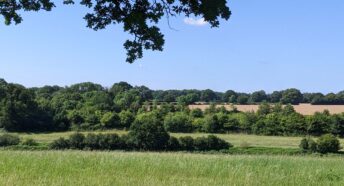Does Transport Secretary revelation scupper plans for Lower Thames Crossing?

Campaigners against the building of the Lower Thames Crossing between Kent and Essex have been encouraged by the news that the Secretary of State for Transport ignored the advice of his own officers in refusing to review the government’s road policy.
The Guardian’s front-page story revealed how Grant Shapps had dismissed the advice from civil servants that the policy should have been reviewed on environmental grounds.
The newspaper says: “It has been a legal requirement to take into account the environmental impact of such [road] projects since 2014. Shapps appears to have pressed ahead despite the advice of civil servants in his own department.”
It suggests that the £27 billion expansion of England’s road network – described by Chancellor Rishi Sunak a year ago as the country’s “largest ever” roadbuilding programme – “has been thrown into doubt” by the revelation.
It came as Transport Action Network sought a judicial review of the strategy to develop such road projects as the Lower Thames Crossing, the Stonehenge tunnel and the A46 Newark bypass.
The Guardian says evidence that Mr Shapps had overridden Whitehall advice was disclosed only “at the 11th hour to the claimants” in the High Court case. That advice had been to review the 2014 National Policy Statement on national networks.
The TAN claim centres on the decision not to review all or part of the NPS and has now been amended to introduce Shapps’s decision to dismiss the civil servants’ advice; this runs alongside the original grounds that the roadbuilding policy was not compatible with commitments to the environment and air quality.
David Wolfe QC states in his submission: “On the day before the limitation period for issuing this challenge was due to expire, the defendant [Mr Shapps] provided the claimant [Transport Action Network] with the advice of his officials, which was that it was appropriate to review the NPS.”
He adds: “The claimants have been presented, on the one hand, with official reasoning in support of a review, and on the other, with a decision by the defendant not to review the NPS, with no explanation of why, or on the basis of what information or considerations, he chose to depart from his officials’ advice.”
Government lawyers, however, claim Mr Shapps has no duty to give reasons for his decision and that the claim is baseless.
Chris Todd, Transport Action Network director, said: “The largest-ever roads programme and world-leading emissions cuts were always the strangest of bedfellows.
“Far from ‘building back better’, the government’s £27bn roads plan would pollute communities, tear through treasured green spaces and turn up the heat on the planet, while making congestion worse. Our legal challenge seeks to end this nightmare and prioritise what’s important to people.”
- To read about the proposed Lower Thames Crossing, see here
Monday, March 8, 2021
- A number of important documents have yet to emerge. For example, a rigorous transport plan and a finalised air-quality assessment. The latter is critical given that allocations at Teynham will feed extra traffic into AQMAs.
- There seems to be no coherent plan for infrastructure delivery – a key component of the plan given the allocations being proposed near the already crowded Junction 7.
- There seems to have been little or no cooperation with neighbouring boroughs or even parish councils within Swale itself.
The removal of a second consultation might have been understandable if this final version of the plan were similar to that being talked about at the beginning of the consultation process. It is, however, radically different in the following ways:
- There has been a major shift in the balance of housing allocations, away from the west of the borough over to the east, especially around the historic town of Faversham. This is a move that raises many concerns.
- A new large allocation, with accompanying A2 bypass, has appeared around Teynham and Lynsted, to which we are objecting.
- Housing allocations in the AONB around Neames Forstal that were judged “unsuitable” by the council’s own officers have now appeared as part of the housing numbers.
- Most of the housing allocations being proposed are on greenfield sites, many of them on Grade 1 agricultural land – a point to which we are strongly objecting.
Concerns about the rush to submit the plan
The haste with which the plan is being prepared is especially worrying given the concentration of housing in Faversham. If the town is to take a large amount of new housing, it is imperative that the policies concerning the area are carefully worked out to preserve, as far as possible, the unique nature of the town. The rush to submit the plan is likely to prove detrimental.
As Swale does not have a five-year land housing supply, it is open to speculative development proposals, many of which would run counter to the ideas contained in the current plan. Some are already appearing. This is a common situation, and one that, doubtless, is a reason behind Swale’s haste.
Our overriding fear, however, is that this emphasis on haste is ultimately going to prove counterproductive. This is because it is our view that the plan, in its current form, is unlikely to pass independent examination. We are urging Swale to listen to and act upon the comments being made about the plan and to return the plan to the council with appropriate modifications before submitting it to the Secretary of State.
Essentially, this means treating the current consultation not as the final one but as the ‘lost’ second consultation.
The consultation ends on Friday 30 April and we strongly urge residents to make their opinions known if they have not already done so.
Further information








